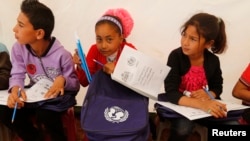BEIRUT —
United Nations officials say a third of the Syrian refugees pouring into Lebanon are school-age children. Most of them have been in Lebanon for more than a year, many even longer, but the majority have no access to formal education.
Marah, 11, has been in Lebanon for a year-and-half, living in a makeshift refugee settlement near the coastal city of Tripoli. She, along with her parents and four siblings, fled the outskirts of Homs, Syria after their farmhouse was struck in a rocket attack.
Despite living in a small two-room house made from cast-off building materials, Marah is luckier than her siblings. She is attending school.
She says it is difficult to adjust from the Arabic-based Syrian curriculum to Lebanon’s French-based one. She tries to get along with her Lebanese peers but there are problems and they sometimes mock her and other Syrian students for being refugees.
Problems or not, at least the eleven-year-old has a chance of fulfilling her ambition of becoming a nurse. In her settlement there are about 200 families and she is one of only a handful of children being educated.
It is the emergency needs of the refugees -- from food to medical care -- that get most media coverage and the bulk of humanitarian funding but as the Syrian civil war drags on, the longer-term needs of the refugees are coming to the fore. The lack of education opportunities for refugee children is preoccupying the representative of United Nations High Commissioner for Refugees (UNHCR) in Lebanon, Ninette Kelley.
“The situation of children is rather dire," said Kelley. "There are over 300,000 new Syrian school age children, which is the same number of Lebanese children who were registered at Lebanese schools last year. And while the ministry of education has indicated they could absorb 100,000 in the formal education system that still leaves over 200,000 without a formal education option.”
The U.N., along with its NGO partners, is now trying to provide basic literacy classes for youngsters, focusing efforts on the tent settlements that are springing up because the Lebanese government has refused permission to build formal refugee camps.
According to the U.N., there are more than 248 of these makeshift settlements in the country now.
Kelley says basic literacy classes are not going to meet the needs of older children in the camps.
“But then there is also the worry of the youth who have had quite substantial education but literacy classes are not enough for them," she explained. " So we are working with all of our partners to mobilize Syrian refugee teachers and other community workers to provide for other forms of informal education across all age groups. But it is a significant challenge.”
U.N. workers say funding for the informal education options that are being explored is a challenge; another problem is that the nearly one million Syrian refugees now in Lebanon are widely dispersed, creating transportation and logistics bottlenecks.
Marah, 11, has been in Lebanon for a year-and-half, living in a makeshift refugee settlement near the coastal city of Tripoli. She, along with her parents and four siblings, fled the outskirts of Homs, Syria after their farmhouse was struck in a rocket attack.
Despite living in a small two-room house made from cast-off building materials, Marah is luckier than her siblings. She is attending school.
She says it is difficult to adjust from the Arabic-based Syrian curriculum to Lebanon’s French-based one. She tries to get along with her Lebanese peers but there are problems and they sometimes mock her and other Syrian students for being refugees.
Problems or not, at least the eleven-year-old has a chance of fulfilling her ambition of becoming a nurse. In her settlement there are about 200 families and she is one of only a handful of children being educated.
It is the emergency needs of the refugees -- from food to medical care -- that get most media coverage and the bulk of humanitarian funding but as the Syrian civil war drags on, the longer-term needs of the refugees are coming to the fore. The lack of education opportunities for refugee children is preoccupying the representative of United Nations High Commissioner for Refugees (UNHCR) in Lebanon, Ninette Kelley.
“The situation of children is rather dire," said Kelley. "There are over 300,000 new Syrian school age children, which is the same number of Lebanese children who were registered at Lebanese schools last year. And while the ministry of education has indicated they could absorb 100,000 in the formal education system that still leaves over 200,000 without a formal education option.”
The U.N., along with its NGO partners, is now trying to provide basic literacy classes for youngsters, focusing efforts on the tent settlements that are springing up because the Lebanese government has refused permission to build formal refugee camps.
According to the U.N., there are more than 248 of these makeshift settlements in the country now.
Kelley says basic literacy classes are not going to meet the needs of older children in the camps.
“But then there is also the worry of the youth who have had quite substantial education but literacy classes are not enough for them," she explained. " So we are working with all of our partners to mobilize Syrian refugee teachers and other community workers to provide for other forms of informal education across all age groups. But it is a significant challenge.”
U.N. workers say funding for the informal education options that are being explored is a challenge; another problem is that the nearly one million Syrian refugees now in Lebanon are widely dispersed, creating transportation and logistics bottlenecks.




